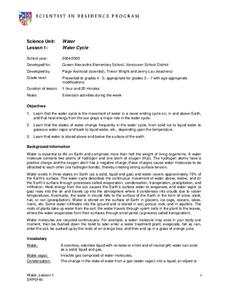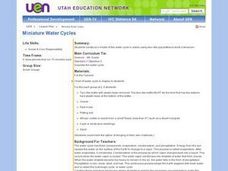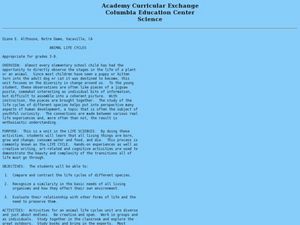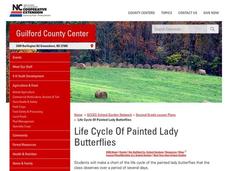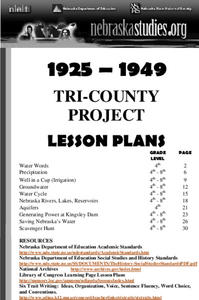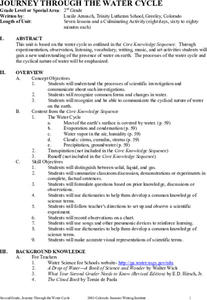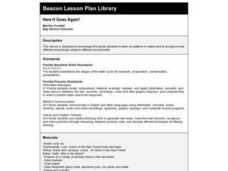Curated OER
Water Cycle Reading and Writing
Here is a great way to get pupils to express a scientific concept in a fun way. After hearing the story of Walter the Water drop and learning facts about the water cycle, the class will write a creative expository piece describing what...
Curated OER
Water Cycle
Young scientists explore Earth elements by conducting an experiment. They define water vocabulary terms such as condensation and precipitation. In addition, they conduct a water experiment in which they build a terrarium, so they can...
Curated OER
Unit 3: Scientific Writing
Write-on! Demonstrate a writing model and support learners as they write an informational essay on a water resource issue of your (or their) choosing. The lesson plan provides a well-scaffolded summative writing...
Curated OER
Water Cycle and Ecosystems
Students explore the water cycle. In this investigative lesson, students examine the water cycle process. They will record their observations and discuss marine and freshwater ecosystems.
Smithsonian Institution
Water/Ways: The Poetry of Science
Water is the source of life. It appears in poetry in both peaceful and torrential descriptions; it appears in earth science in its liquid, gaseous, and solid states. Combine these interpretations of our planet's most precious and...
Curated OER
Life Cycle of the Plant - The Pumpkin
First graders access prior knowledge about pumpkins and read the story Pumpkin, Pumpkin. They will sequence the life cycle of the pumpkin through the use of picture cards and then sing a song about the life cycle of the pumpkin and plant...
Curated OER
Miniature Water Cycles
Fourth graders create a biome of their choosing in a terrarium. Terrariums are observed and results recorded daily for 2 weeks. They observe/record changes in the water within their terrarium and use the data to write sentences...
Alabama Learning Exchange
Water Cycle Animation (A lesson involving handheld computer/Palm Pilots)
Fifth graders animate the Water Cycle using Sketchy on the handheld computers. They write an expository paragraph about the stages of the water cycle using "Word-to-Go" on the Handheld computers.
Curated OER
Oh, Let the Rain Fall Down
Fifth graders explain the three phases of the water cycle in a narraive paragraph where they describe the journey of a single raindrop. They are introduced to five science vocabulary words and personfication.
Curated OER
The Water Cycle: Transpiration
Students identify and describe the stages in the water cycle. Using plants, they determine if they play a role in the cycle and measure the water the plants give off. They complete an experiment to determine if deciduous or coniferous...
Curated OER
Acid Rain
Create a simulation of acid rain in your classroom with lemon juice and bean plants to help kids study the effects of pollution on plants. In addition, learners will listen to a story and write responses based on guiding questions.
Curated OER
The Water Cycle
Third graders investigate water formations by conducting an experiment. In this water properties instructional activity, 3rd graders utilize pie tins, sponges and salt shakers to create an evaporation and saturation experiment. Students...
PBS
Reading Adventure Pack: Oceans
Flotsam by David Wiesner and The Magic School Bus on the Ocean Floor by Joanna Cole, illustrated by Bruce Degen, begin a reading adventure pack focusing on oceans. With story listening and thoughtful discussion, scholars complete several...
Curated OER
Does The Type of Mulch Used Affect Plant Growth?
Students measure, record and graph the plants they grow in a controlled setting. They feed and water the plants as needed and use the scientific method to evaluate the growth.
Curated OER
Sowing Seeds: the Beginning of the Fast Plant Life Cycle
Young scholars plant seeds, observe and tend plants. They identify major plant parts, how to germinate and troubleshoot problems with plants; and, that plants need water, light, and soil nutrients to thrive. They create a Plant Growth...
Curated OER
Animal Life Cycle
Students conduct hands-on experiments. In this life cycle lesson, students are able to observe a variety of animals as they travel through their life cycle (brine shrimp, mealworms, frog eggs and chicken eggs). Students respond to what...
Curated OER
Water Supply
Fourth graders explore weather patterns by completing an Internet project. In this water cycle lesson, 4th graders read assigned text including a Magic School Bus book about precipitation and water. Students complete a water science...
NC Cooperative Extension, Guilford County Center
Life Cycle Of Painted Lady Butterflies
The Very Hungry Caterpillar is the inspiration for this project-based learning activity. Kindergartners create a lifecycle chart for a butterfly with four sections: egg, caterpillar, pupa, and butterfly. It is a three-dimensional...
Curated OER
Water Words
Young scholars define words relating to water and its use in Nebraska. They listen to the story, Snail Girl Brings Water, list the water words from the story, and create a class dictionary.
Curated OER
Journey Through the Water Cycle
Students canvass the water cycle in the seven lessons of this unit. The processes of the water cycle and the cyclical nature of water is emphasized inthis unit.
Curated OER
Here It Goes Again!
First graders work on patterns in nature and to recognize how different living things adapt to different environments such as the rain forest.
Curated OER
Water Wonders
Students explore hydrology concepts. In this environment and biology lesson, students identify and describe macroinvertebrates using a variety of pictures and resources. Students observe and write about a classroom aquarium in which...
Curated OER
Linking Lines to Landscape
Students evaluate art to enhance their core knowledge of fiction, American folk heroes, and the water cycle. In this art lesson, students complete a unit of activities to use art to study various topics of literature, history, and...
Curated OER
Putting the Pieces Together
Students, in groups, explore ecosystems, water cycle, rock cycle, and food web. They create a puzzle piece on white butcher paper based on their information.

